Examining Ghanaian Gold With Commodity Monitor’s Stephen Yeboah
 Bullion.Directory precious metals news 24 March, 2021
Bullion.Directory precious metals news 24 March, 2021
By Spencer Campbell
Founder / CEO at SE Asia Consulting
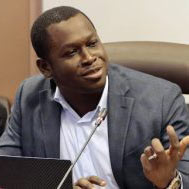 This week I’m speaking with Stephen Yeboah, a policy analyst, researcher and strategic communicator on energy, climate, agriculture, finance and commodities in Africa.
This week I’m speaking with Stephen Yeboah, a policy analyst, researcher and strategic communicator on energy, climate, agriculture, finance and commodities in Africa. Twice selected as LinkedIn Top Voice on ‘Economy and Finance’ and Philanthropy and Global Development for 2017 and 2018 respectively, Stephen is the CEO of Commodity Monitor, the Ghanaian-based commodity trading, logistics and research company that’s leading the drive towards mercury-free mining in Ghana and other West African countries.
1. We always start with the guest giving a quick rundown of their background, so let’s start from the beginning so people get so see where you started along this path?
I have had keen interest in the development status of Africa. What’s accounting for Africa’s inability to grow and transform?
Growing up in Ghana, this question has underpinned most of my engagements so far. Thus, my background in international policy and development. Africa’s progress in hinged on how it gets its policies right. This has been the foundation of all advanced economies.
2. Can you tell us about the work you did for the Africa Progress Panel with former UN Secretary-General Mr. Kofi Annan?
 The Africa Progress Panel came out of the idea of the late former UN Secretary-General Kofi Annan.
The Africa Progress Panel came out of the idea of the late former UN Secretary-General Kofi Annan.
The Panel’s work aimed to leverage policy change through unique combination of cutting-edge analysis, advocacy and diplomacy.
It was a unique opportunity to work for a fellow Ghanaian Kofi Annan and his status in global development made it special. I worked as a researcher. I was an honour as it offered me the chance to work towards advancing the progress of the African continent.
The panel’s work unearthed key issues from the natural resources sector to agriculture to energy. The impact was phenomenal.
We shone the light on key (mis)governance issues of Africa’s extractive sector. Why is Africa poor despite its abundant resources?
I was part of the team that probed the causatives of this problem. And worked at finding solutions through actors’ engagement, including dialogue with African governments.
Today, major policy changes in the natural resources sector became possible of our work at the Africa Progress Panel. Key energy agenda of African institutions has come about as a result of the Panel’s work on energy and climate.
3. Commodity Monitor Limited which is a tech-based business into direct commodity trading and economic and political research with a focus clearly on Africa, the LinkedIn page has over 4,500 followers and puts out some great content, when did you start this side of your business?
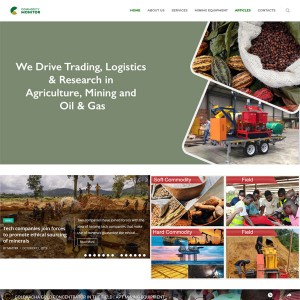 The production, processing, and trading of commodities through global value chains connect actors from developed, developing, and emerging countries alike.
The production, processing, and trading of commodities through global value chains connect actors from developed, developing, and emerging countries alike.
Commodities generate huge economic gains. But they are not without challenges.
Often, developing countries particularly those in Africa grapple with maximising the economic and social potential of commodities.
This is the basis for Commodity Monitor’s operations.
Commodity Monitor, registered under Ghana’s company law, is into the trading, logistics and research of the commodity value chain. We’re into both soft and hard commodities. Commodity Monitor was founded in 2017 by young Ghanaians who are passionate about driving business development using commodities.
Our reputation is everything. With Switzerland and Czech Republic experiences, we are bringing highly reputable commodity trading business to Ghana and the world at large.
4. Beyond the website you have also gotten into the equipment supply business to the Ghanaian miners, tell us more about that business?
As it’s widely known, mining is critical to the survival of numerous economies, particularly those in Africa.
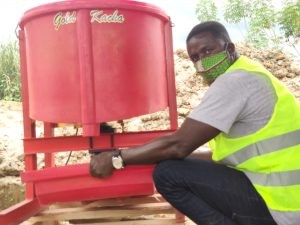 Ghana, where we have started our operations, is a case in point. Ghana is now Africa’s leading gold producer.
Ghana, where we have started our operations, is a case in point. Ghana is now Africa’s leading gold producer.
Total direct domestic fiscal receipts attributable to the mining and quarrying sector improved from GH₵ 2.36 billion (US$411 million) in 2018 to GH₵ 4.02 billion (US$ 731 million) in 2019.
These contributions have been made by small, medium and large scale mining. But where does the big problem lie? It’s the artisanal and small scale mining (ASM) sector. For many years, the ASM sector has suffered negative conceptualisation as a misnomer to mineral-driven development by diverse actors in the country.
But on the flipside, ASM sector contributes close to 40% of gold output in Ghana and employs millions of people. So, at Commodity Monitor, we have started the deployment of efficient, sustainable mineral processing technology.
We’ve to look at the brighter side.
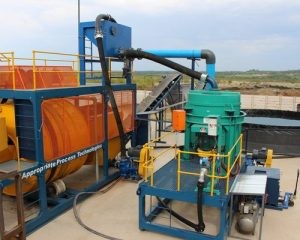 Today, mining and processing activities are carried out by manual means or through application of locally improvised but inefficient equipment and tools.
Today, mining and processing activities are carried out by manual means or through application of locally improvised but inefficient equipment and tools.
As a result, the activities have become synonymous to negative environmental impacts, inefficiency, lack of adherence to health and safety standards, and activities that leverage negative social impacts.
The uncontrolled use and exposure to mercury by artisanal, small and medium scale miners is a major but largely neglected global health problem – putting miners and their communities at enormous health risks.
This is where we come in.
The technology we are deploying will reach a majority of small, medium and large scale miners, even in the remotest mining areas. This is to ensure a triple win: environmentally-friendly mining, high productivity and enhanced livelihoods. We want to send a clear message that “leveraging green mining in Ghana’s mining sector is urgent and possible”.
The current mining practice, which promotes the use of excessive mercury, has recovery rate of about 30-35%. Our technology boasts of 90% and more recovery rate. This is a big win for artisanal and small scale miners.
I am very passionate about this because we have more than 1 million of the country’s youth engaged in ASM. A transformation of this ASM sector means a lot for the country’s progress.
5. The NGO’s working in Africa along side the small and alluvial mining communities are looking to put in processing hubs, places like Burkina Faso where Planet Gold are now set up, is that helpful to the local communities or is it taking something away? I’d like your impression of this arrangement.
 The diversity of actors is critical in the mining sector. The idea of processing hubs has a lot of potential.
The diversity of actors is critical in the mining sector. The idea of processing hubs has a lot of potential.
But in my experience, I have come to understand that one needs to learn and appreciate the behaviour of artisanal and small scale mining. Ghana in the early 1990s had established centralized processing centers in Tarkwa in Western Ghana and Bolgatanga in Northern Ghana.
They failed to work.
Why? There are lessons to learn.
I believe that finance and technology must go together to make ASM work for rural communities. PlanetGold’s intervention in the ASM sector is timely and critical.
At Commodity Monitor, we will use our technology to make sure it works for the miners. In Ghana, a lot of NGOs are working to manage the activities of artisanal and small scale miners. What is missing is to tackle head on the real issues: missing technological needs of miners.
This is where we are looking at. Each miner deserves an improve technology that will boost his operations and shift him/her away from the use of dangerous chemicals like mercury.
6. As people who have been on the ground or know Ghana well understand the locally traded gold is efficient in pricing. The Ghana government has put in changes to policy for exporters to prove source of funds which has been helpful to eradicate the local black-market trade that occurs between Ghana and Dubai but we hear banks have taken advantage of this by giving wider pricing on Ghana Cedi (the local currency). What can you tell us about this and what can be done to help Ghana in their exports of gold?
To me, it’s all about the ‘implementation’ of the regulations in the gold sector.
The laws in Ghana clearly captures what ought to be done in the gold trading regime.
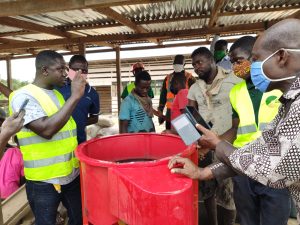 We have experienced over the past years the proliferation of scoundrels who pose as gold traders. I have witnessed investors looking thousands and millions of dollars because of bad gold trading deal. The chain is interconnected. If you trade gold, you have to be interested in gold extraction.
We have experienced over the past years the proliferation of scoundrels who pose as gold traders. I have witnessed investors looking thousands and millions of dollars because of bad gold trading deal. The chain is interconnected. If you trade gold, you have to be interested in gold extraction.
The banks in Ghana have failed to latch on to this opportunity of buying gold from artisanal and small scale miners.
They may not understand the benefits but they’re more so overly focused on risks. We need to change this.
What about using our mercury-free mineral processing technology as a way to access ‘green’ gold from artisanal and small scale miners?
We’re working to roll out a plan of working with investors who will invest in machines and get a secured, known sources of clean gold. This is the chain that will provide a win-win situation. I will always maintain again that gold buyers have to be realistic! Gold miners know the international gold price.
There is nothing like having a 30% discount or cheaper gold.
7. What is your position on the recent announcement that the Ghanaian government are planning to list in London the Gold royalties from the country?
For more than a century of mining, rural communities that host mining operations have not developed.
They lack basic infrastructure and bear the brunt of water, forest and land destruction.
Any government intervention must aim at improving the lots of the people. The government is proposing to sell almost 76 per cent of its future receipts from gold royalties. Will it be beneficial for the country and particularly the mining communities who have not seen any decent development?
In my view, the focus should be on developing a strong local economy that supports value creation. We have thousands of young people into ASM. Why are they not getting a better life? It’s because they produce inefficiently. Why not boost their operations to increase their income flows?
There are critical matters that need government attention and not just the focus on royalty that accrues to the state via contributions from big mining companies.
8. With more refineries popping up across West Africa do you see a need for an oversight body that would work closely to ensure the gold refined and traded in country comes with a legitimate stamp of approval?
It’s a positive thing that more refineries are coming up across West Africa. A coordination approach of these refineries will help shape the gold value chain.
 Today, we are all concerned about sources of gold.
Today, we are all concerned about sources of gold.
The refineries should come together and work along the gold chain to know the source of their gold.
Would a refinery buy gold that came from a conflict-ridden region?
Adding value is what we all want to create value for Africa’s gold.
But we can in addition create an environment for ‘clean’, ‘greener’ gold. We need to work together to achieve this.
9. Gold smuggling in Africa is as we all know rife, what can be done to stem the tide of bad materials coming from illegal sources?
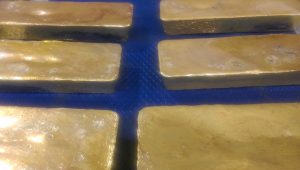 A collaborative approach is critical to reducing or ending illegal gold sourcing.
A collaborative approach is critical to reducing or ending illegal gold sourcing.
This approach must be a bottom-up driven. Africa has its Africa Mining Vision. This strategy if it was implemented by various government could create the environment for collaboration to stop gold smuggling. Countries lose a lot from smuggling.
Let’s organise the miners and offer good incentives in terms of production technology and good pricing.
10. Would you think that a working committee between the DMCC and the Ghanaian Government for the exchange of gold would be something that’s achievable to help govern the industry better?
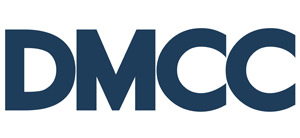 Dubai has emerged as a critical destination of commodities from the African region, particularly gold.
Dubai has emerged as a critical destination of commodities from the African region, particularly gold.
An effective gold trading regime requires a strong working partnership between different jurisdictions, especially the source and destination of gold.
Let’s not think about even forming a working committee.
We have to think about forging a strong private sector participation. The private sector is at the heart of a successful collaboration between DMCC and the Ghanaian Government. I am aware of private entities that are working on a blockchain technology to drive exchange of gold.
We have to get the governance parameters right.
11. Where can people find you and your business online to connect?
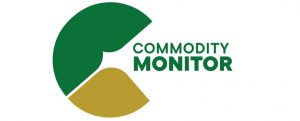 I can always be reached by email: stephen.yeboah@commoditymonitor.org
I can always be reached by email: stephen.yeboah@commoditymonitor.org
or telephone: +233 (0) 302 554830.
You can also visit our website: www.commoditymonitor.org or LinkedIn
Spencer Campbell


Spencer Campbell is a Director at SE Asia Consulting Pte Ltd, and provides key advisory services across the Mining and Precious Metal Refining Sectors, working with a number of leading gold refiners and processors.
This article was originally published here












 Material provided on the Bullion.Directory website is strictly for informational purposes only. The content is developed from sources believed to be providing accurate information. No information on this website is intended as investment, tax or legal advice and must not be relied upon as such. Please consult legal or tax professionals for specific information regarding your individual situation. Precious metals carry risk and investors requiring advice should always consult a properly qualified advisor. Bullion.Directory, it's staff or affiliates do not accept any liability for loss, damages, or loss of profit resulting from readers investment decisions.
Material provided on the Bullion.Directory website is strictly for informational purposes only. The content is developed from sources believed to be providing accurate information. No information on this website is intended as investment, tax or legal advice and must not be relied upon as such. Please consult legal or tax professionals for specific information regarding your individual situation. Precious metals carry risk and investors requiring advice should always consult a properly qualified advisor. Bullion.Directory, it's staff or affiliates do not accept any liability for loss, damages, or loss of profit resulting from readers investment decisions.

Leave a Reply